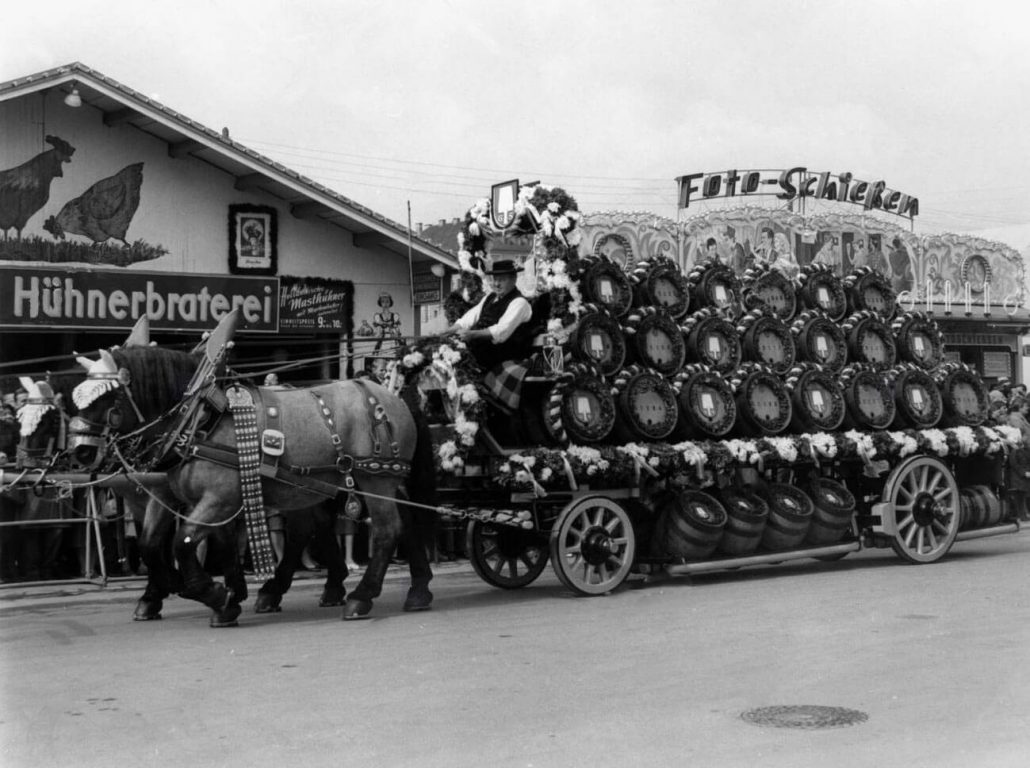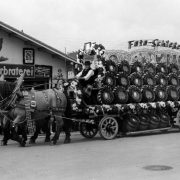Book 2: Chapter 5
Europe on One Dollar a Day
Join the Navy and see the world.
They weren’t kidding.

“There he is,” a buddy of mine smiled as he stepped into the cantina, “the Escape Artist. How’s it hangin’, Houdini?”
“S’all right,” I said, taking a cool sip of Budweiser. “Just makin’ tracks, matter of fact.”
“Now you see him, now you don’t.” My burly Irish buddy, Terrance Mac McLennon, ordered up a beer of his own and sat down on the stool next to mine. “Where you off to this time?”
“Oktoberfest in Munich,” I said, glancing down at my half-filled glass. “Real beer, not this.”
“Come along,” I said, raising my glass. “You know the brass wants us to go out and toss around a few bucks, put some of those ugly American rumors to rest. On top of that, the dollar here is through the roof. They say you can’t buy happiness, but out here I think it’s actually pretty affordable.”
“Not to mention readily available, but Munich? Why not Paris or London, or some other … allied city?”
I shook my head. “It’s been almost twenty years, Mac. Kennedy’s taking us into the future, no reason not to go along for the ride.”
Mac shook his head and raised his can. “Never forget, that’s all I’m saying.”
“Then you can remember over a beer and nice, juicy bratwurst.”
In an exaggerated accent, Mac said, “Macht schnell!” German for make it quick, and that’s just what we did.
Getting around was easy and cheap. They used to say you could live in Europe on a dollar a day, and in a way, that was true. Keep in mind that we were only earning $5.50 a day, but travel was free. The air terminal at Ft. Lyautey had flights were going out to all manner of destinations and all we had to do was show up. Flash a pass, check the roster, and go. Generally, I’d show up without knowing where the flights were heading out to. Oftentimes that was half the fun! However, not this time, I was Munich bound. Mac by my side only added an element of adventure, and danger.
“Switzerland,” Mac said, glancing at the roster, “tomorrow at oh-eight-hundred.”
“Next time,” I said. “We’re on the cargo to Naples, we’ll connect from there.” Mac nodded, ready to follow my lead. I was the Escape Artist, after all, he knew he was traveling with the right guy.
We swapped our uniforms for civvies and took the bus into Naples. The pasta meals there rolled out covered in rich cream sauces and hearty meats, while heavy Italian wines washed it all down. The restaurants and cafes were alive with that beautiful Italian language, the passion of the Med overflowing in their contentious conversations, hands gesticulating, chests and chins thrust forward over the tables.
Bella Italia!
The night crawled into morning, the purple of dusk rising out of the midnight black. Mac and I took the free bus back to the barracks and slept it off, recovering our strength for the next leg of our journey. More free chow and the next day set off to Munich, where the real party was happening. Naples had been a nice warm up, of course, a welcome break from life on ship, but I was determined to go to Munich, and nothing was going to stop me.
“So why Munich?” Mac asked me, “Who is she?”
I chuckled. “Don’t know a soul there. Oktoberfest is one of the biggest parties in Europe, Mac, and these are Germans! Drinking beer is their national pass time. How can you pass that up?”
Oktoberfest was renowned even then, and Munich’s beer gardens lived up to their reputation. Block after block of long tables and wooden benches were draped with tarps and tents, protecting celebrants from that Bavarian autumn. The sausages were juicy and flavorful, their array staggering. Mac didn’t seem able or interested in telling one greasy meat stick from the other, the currywurst from the brats.
German beer is more than just a beverage, more than just a way to get drunk (though it certainly does the trick). The Germans are well-known brewmeisters and they craft their beer with love and respect, with countless generations of tradition evident in the hoppy heads and robust colors. The beers in Germany were (and still are) much more robust than their American counterparts.
Mac leaned over. “Munich,” he said, draining his glass. “I gotta say, Houdini … when you’re right, you’re right.”
I was on a real winning streak. Of course, that was thanks mostly to the Navy and their incredible travel connections. Europe was our playground, and why not? We’d earned it. We’d saved it, preserved it and now we were going to enjoy it.
The meals in Portugal were huge, and though we had to pay for our bread and olives, the portions were gigantic, the food colorful, flavorful and cooked to perfection. The grilled sardines were out of season, but devotees weren’t about to wait until the spring. The salty little devils were crispy off the grill, the meat tender and succulent. A lot of the locals just gobbled them up, bones, head and all, but neither Mac nor I were that enthusiastic about it. A very tasty snack though, and not one you find anywhere in the States.
The better tascas, or family-owned restaurants, in Lisbon closed their kitchens between three in the afternoon and seven in the evening, which was something I had to get used to. The Latins took their leisure in the afternoons, ramping up for late nights of revelry and banter. I was used to the American way of doing things; working industriously through the day and then playing hard at night. Still, a few hours in the middle of the day with nothing to do but relax was pretty hard to refuse, and frankly it still is (even more so now, to be honest). Also, they did serve sandwiches and meat croquettes in those hours, and those were pretty great too.
Portuguese bullfighting was different from what I’d expected. In Spain, which popularized the sport, the animals were almost always killed in the ring. The Portuguese bulls had it a little better, rounded up and tired out. Instead of stabbing the beast, a crew of men faced the creature in the ring and let it charge at them. It seemed suicidal as the bull rammed into one of them, while the crowd cheered. I could hardly breathe. Never the less, the four or five guys really knew how to roll with a punch, because they eventually did succeed in physically catching and capturing the bull.
The amazing rock formations of the coast offered crevices to explore, and arches to boat or swim under. It was like a living masterpiece of natural artwork; rustic orange and pale, mossy green against the marine blue of the ocean waters.
Byzantine architecture, cobblestone mosaics, waves of color and fanciful designs, on the streets gave urban Portugal a similar artistic flare.
The endless Spanish horizon stretched out on all sides of us; those famous windmills of La Mancha standing in their silent, eternal vigil. It was hotter than I expected. The hundred-degree heat wasn’t more than what I was used to coming from Connecticut. Luckily the country’s amazing beaches provided plenty of ocean breeze.
The Spanish took their siestas even more seriously that the Portuguese, but Mac and I were ready to sit back and drink through a few afternoon hours, preparing for the monstrous parties to come. The Spanish loved to celebrate, their Latin blood was hot, percolating with a love of life and a lust for living. The Latin’s passion for music and dance, food and drink, romance and dialogue are known throughout the world, and not without reason. Although, all that fun required strength and stamina; so even if a few hours of inconvenience in the afternoon were what it took to make it through one of those astounding Spanish fiestas, neither of us was going to argue the point. We were too busy napping anyway.
Spain felt like a little Europe of its own, a compendium of different cultures, from city to city. Madrid was as alien to Catalonia as Barcelona was to Galicia. The diversity was dizzying, and the natural beauty of the country followed suit. The plains were flat, of course, but the Pou Clar natural springs were exotic and lush, craggy rocks jutting out of the refreshing, revitalizing, glistening and clean waters which trickled down the stone walls.
It was true, what they said: España es diferente. Spain is different … even from itself.
The April Fair, the running of the bulls at Pamplona… Spain offered year-around indulgences and distractions. She kept calling us back and making it harder and harder to leave with every visit.
Even Spain could not hold us for long, and the allure of Paris and the rest of France called to us, too. What a time to be a young man, with purpose, skills and drive. My whole life laid out in front of me, as did all the time in the world to savor the greatest cities in the world.
Accordion music wafted through the streets, men standing at the cafe counters smoking cigarettes, drinking little cups of espresso, and shouting at each other. The lights of Paris could not fail to live up to their legend, the streets of the champs-élysées glittering in a golden array of the world’s finest comforts and luxuries.
There wasn’t much you could buy there and still get away with living on a dollar a day. Of course, this was one of the great shopping districts in the world. The smells, sights and sounds were all free, and they were the very best parts of the experience as far as I was concerned.
Foggy London stood proud, resilient with the rest of Europe, survivors of that terrible political storm of just a few decades before. The bell known as Big Ben hanging in the Elizabeth Tower rang out over the Thames, a chime that reverberated with ancient history.
On the streets, it was a different matter. The pubs rang out with the drunken singing of men and women, young and old, slurring their maritime odes to love and loss on the high seas, warm beers upraised, swaying them back and forth like the waves of the Atlantic herself. Bacon buddies, platefuls of bangers and mash were hot and bracing against the cold weather, comfort food that was as rich and rustic as the thick wooden beams and dark oak. It was this same food that marked every public house on nearly every street corner.
England had a lot more to offer than London, and it wasn’t long before Yvonne a woman from Paris, ferried on across the Channel. We took a canal boat through beautiful rural England and met some charming locals who took us for a married couple, some even seeming a bit put-off that we weren’t married.
There was little time to reflect on the friendly folks of the Great White North, as Austria beckoned, and the Escape Artist was ready to answer the call.
Yvonne and I skied St. Anton am Arlberg, with an elevation so rarefied that I felt as if I was on another planet, a white world of heaving, icy breezes, steep slopes, endless crags and crevices. This was a world that seemed unfit for man or beast, a hostile and alien place that was as deadly as it was beautiful. Yet there I was, tearing down those powdered cliff faces, nearly vertical drops. Every muscle in my body tensing and flexing to keep my speed in check and the momentum in control. I was in the Navy, after all, and some of the most valuable things service teaches you are discipline, training, sharpened instincts, readiness to risk, and an inability to allow yourself to be intimidated.
The mountain seemed to respect that. It rewarded us with panoramic views, a thrush of speed and motion so great that I recalled it in my sleep for years afterward. Even to this day, I can remember the torrent of icy powder around me, hands clenched around the poles, heart pounding, blood racing, nerves at the very surface, my instincts honed and sharp, and my senses at the ready. We were firing on all pistons, living life to the absolute maximum.
Almost everything we did, it cost me virtually nothing. Don’t they say that the best things in life are free?
The Homburg Imperial Palace and the Schoenbrunn Palace delighted Yvonne, who responded to their regal aspect. I had to admit even then that this was a lifestyle to boggle the mind: Every luxury, every fine food and drink, the best of the best from every corner of the world, paintings by the hands of legendary masters, furniture which was hand carved and included tiny renderings of angels and fruit baskets so intricate they didn’t seem like they could have been created by hand at all.
It was all very different from life back in Connecticut, or any of the states I’d visited. I loved my home, of course, I still do and always will. You’d have to scour Connecticut pretty good to find a place like the Homburg Imperial Palace, and even then, you’d come up a little short.
Yvonne and I eventually met up again in Italy for an extended tour of the country Italian Americans like to call the boot. Like Spain, Italy was expansive and presented a patchwork of different cultures. To the north there were the Alps, the same mountain chain that ran through Switzerland and much of Europe.
To the south lay Rome, the famed city of seven hills, a place so steeped in history that I felt as if I was going back in time. The ruins stood in the very center of the modern city, built around its past to accommodate it, to revere it, to remember it and repeat its example or not, depending on their perspective. For me it was an outdoor museum. Past and present seemed to collide, making each one all the sharper and dearer.
As with all the major European cities, there was the food. Europeans didn’t (and I believe still don’t) eat the way we did in America. At the time hamburger restaurants were introducing drive-through windows in America, everything was getting faster, more hurried. But in Rome, or Paris, or any of these magnificent places, the meals were served slowly, letting hours pass as the culinary experience progressed. It wasn’t a matter of feeding one’s body, but rather one’s spirit, one’s soul.
And with a flash of that military pass, it was often a European delight to treat me and my guest, a measure of gratitude and fraternity. On just $5.50 a day, I was always more than ready to humbly accept.
Further south lay Sicily, notorious as the cradle of organized crime, omertà, but for me and Yvonne it was a pastoral place of medieval cliff side villages, old men and red wine, shepherds and students with backpacks and guitars, all smiling, waving and journeying through their youth.




HI Kirsten
thanks for the updates and yes Europe is a great adventure being born American but heritage Venetian there was alot to broaden my horizons
great to hear you encouraging your daughter and more spirit in writing the better. Of course having many challenges along the way writing is only one of dozens of my adventures in growing both in business / health / happiness / timing and of course mystery & magic
wishing you and yours Good Chi Energies
Anthony
What a great surprise to find as I was checking out your site for brushes. I am from Denmark, moved to California 1958 and can really identify. My daughter, an equine vet in New Zealand is now also a writer and will love your memories. I’ve given her my input and love to see the spirit of that in her books. Thanks, great reading!